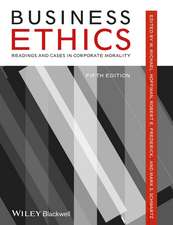Financial Ethics
Autor Andrew McCoshen Limba Engleză Hardback – 31 aug 1999
The second trail is an examination of the guidance people can obtain from four of the world's great religions on exactly how people ought to behave when engaged in the financial industry.
The second part of the book is contained in Chapters Three to Nine. If people propose to advise the financiers to be ethical, it is important to know what is meant by this, and to call upon reliable sources and why they are using the four particular religious sources chosen. The next four chapters extract business and financial commands and one or two important interpretive writings from Judaism, Christianity, Islam and Buddhism.
Part Three of the book (Chapters Ten to Thirteen) is a distillation of the concepts from the religions, an application of the concepts to the modern financial world, and a discussion of the various organizational tools which might be used to put them into operation.
| Toate formatele și edițiile | Preț | Express |
|---|---|---|
| Paperback (1) | 902.55 lei 6-8 săpt. | |
| Springer Us – 2 noi 2012 | 902.55 lei 6-8 săpt. | |
| Hardback (1) | 908.31 lei 6-8 săpt. | |
| Springer Us – 31 aug 1999 | 908.31 lei 6-8 săpt. |
Preț: 908.31 lei
Preț vechi: 1107.70 lei
-18% Nou
Puncte Express: 1362
Preț estimativ în valută:
160.73€ • 188.47$ • 141.15£
160.73€ • 188.47$ • 141.15£
Carte tipărită la comandă
Livrare economică 13-27 februarie
Preluare comenzi: 021 569.72.76
Specificații
ISBN-13: 9780792385561
ISBN-10: 079238556X
Pagini: 180
Ilustrații: X, 164 p.
Dimensiuni: 155 x 235 x 15 mm
Greutate: 0.43 kg
Ediția:1999
Editura: Springer Us
Colecția Springer
Locul publicării:New York, NY, United States
ISBN-10: 079238556X
Pagini: 180
Ilustrații: X, 164 p.
Dimensiuni: 155 x 235 x 15 mm
Greutate: 0.43 kg
Ediția:1999
Editura: Springer Us
Colecția Springer
Locul publicării:New York, NY, United States
Public țintă
ResearchCuprins
I -The Problem Domain.- 1 The Jobs of the Capital Markets, and the People Who Do Them.- 2 A Focus on the Problem we are Addressing.- Two - Guidance From The Religions.- 3 Plan and Introduction to the Religious Guidance Chapters.- 4 The Jewish Tradition.- 5 The Christian Tradition.- 6 The Islamic Tradtion.- 7 The Buddhist Tradition.- 8 An Aggregation of the Commands of the Religions.- 9 The Remaining Task:The Commands We Have Yet to Fulfill.- III - Testing, And Then Marketing, The Second Ethical Command.- 10 Some Financial Transactions for Testing.- 11 Political and Organisational Tools for Gaining Acceptance of an Ethical Command.- 12 Consequences and Conclusions.- 13 Epilogue: A Personal Action Plan.










